Uber wants people to know that the company is changing, but there's one area where progress remains slow: equality for women.
"Frankly, I don't think we know what 'good' is yet. We know what 'better' is and we want to get better," Uber CEO Dara Khosrowshahi told CNN about the report, which was released Tuesday, adding that in terms of diversity the company "needs to improve across the board."
Less than a year after former CEO Travis Kalanick's departure following allegations that included gender discrimination, the 2018 report found that racial and gender diversity has not significantly changed. Still, the overall representation of women at Uber showed slight growth.
The number of women at the company went up 1.9 percent, bringing the total percentage of women in Uber's global workforce to 38 percent.
"While we've made some good steps as it relates to diversity at the company," Khosrowshahi told CNN, "we want that to be reflected in the senior leadership as well."
Women in leadership roles — those at the director level and above in areas like marketing, operations, finance and legal — made up about 21 percent of Uber's workforce, down 1.1 percent from last year.
Meanwhile, women in technical leadership roles — those at director level and above in areas including tech, engineering and product — actually grew 4.3 percent, up to 15.6 percent. The percentage of female tech workers, such as engineers and IT specialists, also grew from 15.4 percent to about 18 percent this year.
Frans Johansson, CEO of diversity-focused consulting firm The Medici Group, tells CNBC Make It that although Uber hasn't made significant progress, it's still progress nonetheless.
"While a loss in general female representation in leadership is non-ideal, the gains made by Uber's female tech leadership is very encouraging," says Johansson. "The case can be made that this metric is far more interesting and valuable, especially as it pertains to innovation and business performance, for Uber and tech companies in general."
Last year, Uber brought several prominent women onto its leadership team. One big hire was former Apple marketing executive Bozoma Saint John, now Uber's new chief brand officer and one of the few black female C-suite executives in tech. Newly-appointed general managers Susan Anderson and Jodie Auster joined three other women on Uber's eight-person executive team in Australia.
Johansson recommended taking a look at other tech giants who have released diversity reports in recent years, such as Facebook, Apple and Google.
As of their 2017 reports, Facebook's global senior leadership is 28 percent female, Google's leadership is 25 percent female and Apple's is 29 percent female. Although these three companies break down the gender balance of men and women in their workforce and general leadership roles, none of them detail the metrics for gender balance in tech and non-tech leadership roles as Uber does.
"Uber's nuance in tracing their female leadership in tech gives more insight to how they are bringing diversity closer to their business and innovation," Johansson says. "And in our experience, that is the best way to sustain a culture of inclusion and innovation."
Although Khosrowshahi told CNN it's "too soon" to set specific goals for the future of diversity and gender equality at the company, Johansson noted the Uber CEO's discourse around the topic is a huge step in the right direction.
"The fact [Khosrowshahi] is focusing on changing the language and pushing for change at the company shows they have all the necessary pieces, but the challenge is to take the necessary steps to get more diversity in senior leadership roles," Johansson says.
As CEO of Expedia, Khosrowshahi helped the company achieve full gender parity, bringing its U.S. workforce to 51 percent women and 49 percent men, according to company data from June 2016. At the Women in the World 2018 Summit earlier this month, Khosrowshahi reiterated his desire to internally promote more women into leadership roles at Uber.
An Uber spokesperson tells CNBC Make It that the company has implemented equitable recruiting and hiring practices over the past year to help eliminate bias throughout the interview process, including taking steps like reworking over 1,000 job descriptions to make them more inclusive.
The company also points to its new chief diversity and inclusion officer Bo Young Lee, appointed two weeks ago. She will focus on Uber's problem areas when it comes to hiring and promoting women and recognize managers who promote equality within the company.
"Uber is sending signals of its commitment," Johansson says. "I think there is an intention to bring change. That is exciting."
Like this story? Like CNBC Make It on Facebook.
Don't miss: Why 32-year-old Oprah Winfrey threatened to stop working to prove a point to her boss


